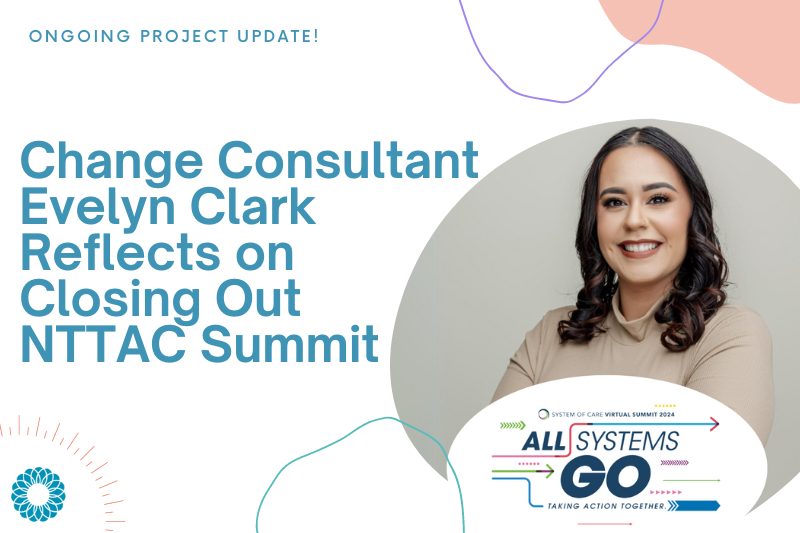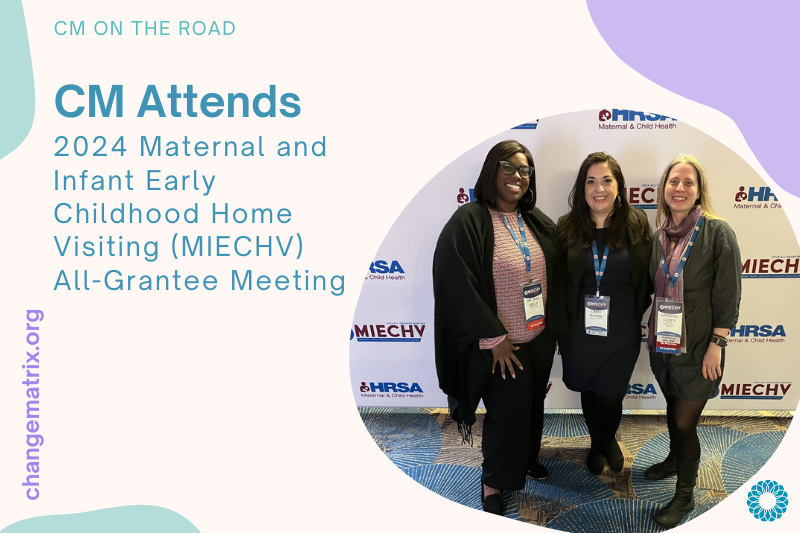This article was written by Founding Partner Elizabeth Waetzig and Change Consultant Lauren Vargo
In late 2021, Change Matrix (CM) was retained to support the planning and facilitation of the 2023 System of Care (SOC) Summit for the state of Wisconsin. The vision of Wisconsin’s SOC is that children and families are valued, understood, and supported in their communities. The Wisconsin SOC Initiative will infuse principles of the System of Care philosophy, an array of services and supports, and infrastructure into the support for children and families by fostering a process that embraces the collective experiences, knowledge, and resources of all partnerships. The CM team — Managing Partner Elizabeth Waetzig and Change Consultants Lauren Vargo and Evelyn Clark — came together to provide consultation in planning, evaluation support, and connections to youth advocacy organizations to inform the Summit. On April 24 and 25, the Wisconsin SOC Summit convened in Wausau, WI.
CM collaborated with the Wisconsin Department of Human Services (DHS), the University of Wisconsin Whitewater, and additional partners across the state to create the Wisconsin SOC workgroup. The first task was to articulate the purpose of the summit. A consensus among the workgroup was needed on why they were convening a diverse group of providers, agency representatives, advocates, youth, and family members and caregivers, and what they hoped for from a Summit.
To inform the Summit, data gathering was critical in telling the story of those with lived experience across the state. The state developed and disseminated a survey and collected over 600 responses from individuals with lived experience working in behavioral or mental health systems and tribal nations. CM facilitated four focus groups, or “sharing circles” as the workgroup named them, with youth, young adults, and parents/caretakers. Sharing Circles that were hosted for tribal communities and nations were facilitated by Bizhikiins Jennings, a Wisconsin Bad River Tribe member, in partnership with the Wisconsin SOC workgroup. CM staff led evaluation activities and identified the key findings of strengths, gaps, barriers, and opportunities that youth and families reported experiencing when trying to access care. Additionally, CM launched two ThoughExchange data collection questions at a Wisconsin Wraparound conference and at Regional Behavioral Directors meetings across the state. Around 120 participants contributed original thoughts to both ThoughtExchange questions and over 2,000 ratings were recorded on those thoughts. The top themes identified from both ThoughtExchange questions were financial, workforce retention and development, and collaboration across systems serving children and families.
A pre-Summit data reflection and workgroup meeting was held in Madison, WI in late January 2023. CM presented the sharing circle and ThoughtExchange data to the workgroup and an afternoon was spent discussing the data using an emergent learning tool. Members shared their observations, insights, hypothesis, and opportunities to test and continue to learn.
As the agenda took shape, three specific focus areas organized the two days: Inspire, Inform, and Implement. The first half of day one was structured to inspire the audience about all the history of a SOC in Wisconsin and the second half informed participants using data and storytelling. The data presented was a summary of the survey collected by the state; sharing circles with youth, young adults, parents and caretakers, and tribal nations and communities; and the ThoughtExchange responses. To complement the data presented, CM moderated and facilitated a storytelling experience where speakers were identified and invited to share their story onstage. All the speakers had lived and/or professional experience within systems in Wisconsin. Five storytellers shared their experiences providing services, and ow they contributed to infrastructure and much of the philosophy of SOC matters. The dialog fully engaged audience members and the day ended with an Indigenous healing circle that left all feeling inspired and moved.
The second day of the Summit organized participants in small groups to envision and plan for implementation of a System of Care. The agenda, created by CM, was adapted from search conference methodology and included visioning, current reality, outcomes, indicators, activities and needed supports. Most participants returned for day two to engage in table discussions around pre-determined topics, as supported by the data. There were 12 tables with topics ranging from peer support to workforce to equity. Each table stayed together with their topic through the planning. They started by offering headlines or tweets they would like to see in three years to articulate a vision. Next, they offered their ground truths and trends they saw from their perspective — this served as their current reality. The rest of the time on Day 2 was spent in small group dialogue filling in the rest of their planning templates provided by CM.
There were approximately 150 participants who registered, all of which were intentionally invited by Wisconsin DHS. The first day, Inspire and Inform, was both inspirational and informative. Speakers from a federal agency, state leadership, and local advocates inspired all who heard them to remember that SOC works. It is not a checklist of things, but a philosophy that promotes local communities to customize their SOC to their own people, resources, needs, and culture. Data was presented that indicated that while intent on behalf of the state and local entities was to serve, youth and families didn’t experience service in the way it was intended.
The Summit was a giant step forward toward realizing statewide, community-driven, effective systems of care, but the work continues.





